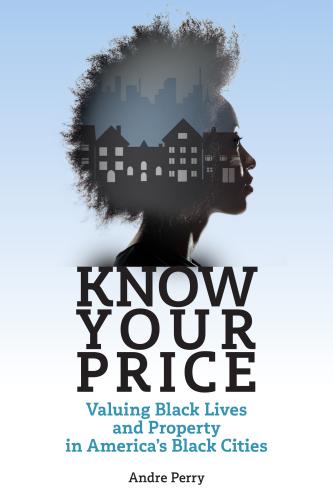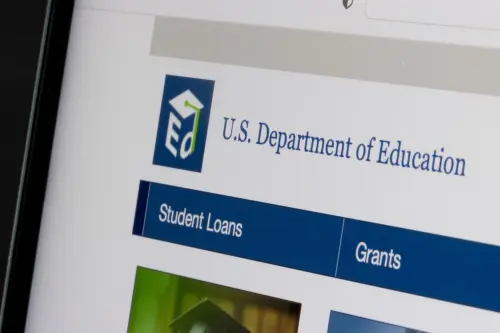Contents
- Barriers to college attainment in Nashville reveal underlying economic disparities
- Addressing the economic conditions inhibiting college attainment
- North Nashville needs a reparations policy
North Nashville, Tenn.’s famed Jefferson Street was once a booming hub for the city’s Black middle class. During the Jim Crow era, Jefferson Street was known for its thriving business and entertainment districts that were supported by key institutions, including four historically Black colleges and universities (Tennessee State University, Fisk University, Meharry College, and the American Baptist College). Like Tulsa, Okla.’s Black Wall Street, Jefferson Street provided an area in which residents could deposit checks in Black-owned banks, shop at Black-owned stores, and dine at Black-owned restaurants. It was also a central hub of the burgeoning Nashville music scene, with music legends such as Etta James and Jimi Hendrix performing in the clubs that lined the street.
But in the late 1960s, Nashville city planners built interstate highway I-40 in the middle of North Nashville, decimating the commercial corridor and displacing business owners and residents. A 2018 article in Nashville Scene detailed how white planners did not want a highway to affect property values around Vanderbilt University, so they routed the highway through the Black-majority neighborhood instead. According to the article, the development led to the demolition of 650 homes, which displaced 1,400 residents. Real estate values for the remaining properties dropped by 30%, compounding the loss of familial and communal wealth.
Not surprisingly, today, North Nashville is one of the most economically precarious locations in the metropolitan area. The neighborhood where Jefferson Street sits posts the highest incarceration rate in the nation (14%), according to research by our colleagues at Brookings. This must be contextualized in a discussion of the area’s rampant poverty; that same Brookings report notes that child poverty in this ZIP code is a stunning 42%, compared to the most recent official national rate of 14%. And despite the presence of four HBCUs, the college attainment rate is only 30%, compared to statewide rate of 43%, according to the Lumina Foundation, a nonprofit devoted to boosting college attainment nationwide.
Table 1. North Nashville has the nation’s highest incarceration rate
| City | Zip | Incarceration Rate | Child Poverty Rate | Percent Black | College Attendance |
|---|---|---|---|---|---|
| Nashville, Tennessee | 37208 | 14% | 42% | 93% | 30% |
| Portsmouth, Virginia | 23704 | 11% | 37% | 77% | 32% |
| Waco, Texas | 76707 | 11% | 35% | 34% | 24% |
| Cincinnati, Ohio | 45214 | 11% | 46% | 65% | 22% |
| Fort Myers, Florida | 33916 | 11% | 37% | 82% | 24% |
| Jacksonville, Florida | 32206 | 11% | 46% | 79% | 20% |
| Orlando, Florida | 32805 | 10% | 42% | 93% | 24% |
| Norfolk, Virginia | 23504 | 10% | 52% | 90% | 26% |
| Richmond, Virginia | 23222 | 10% | 27% | 80% | 29% |
| Tusla, Oklahoma | 74106 | 10% | 41% | 62% | 29% |
Source: Brookings Institution, 2018
The correlation between poverty and incarceration is well documented. However, we shouldn’t view poverty as causing criminality and higher incarceration. Rather, both are symptomatic of the systemic racism that resulted in the destruction of assets that increase social and economic mobility. Federal, state and local governments have yet to provide recompense to the residents of North Nashville (and other areas) for federally backed programs and initiatives that destroyed Black neighborhoods and the wealth and opportunities those places provided.
Recently, Nashville’s city government, chamber of commerce, and other civic organizations and nonprofits partnered to develop a collective strategy to boost college enrollment, with the hope of revitalizing these communities through better job opportunities corresponding to degree attainment. These efforts come on the heels of the Drive to 55 statewide initiative that then Governor Bill Haslam introduced in 2017, which set a goal of getting 55% of state residents to receive a college degree or certificate by 2025.
But without naming or addressing systemic racism, efforts to increase educational attainment in order to increase labor participation and reduce poverty may miss a significant part of the problem. Increasing the number of credentials won’t restore the wealth and opportunities that were extracted by bigoted transportation and housing policies. Initiatives to increase educational attainment must address what caused the damage in the first place. In other words, North Nashville residents need reparations.
Barriers to college attainment in Nashville reveal underlying economic disparities
College attainment is typically correlated with higher wages, particularly for workers who can make the transition into the knowledge economy, leading many to create programs aimed at boosting college attainment rates. To that end, in 2017, the Lumina Foundation designated Nashville a Talent Hub, providing the city with additional funding to build a coalition of over 100 organizations to collectively improve enrollment and completion rates, led by the Nashville Area Chamber of Commerce.
College degree attainment certainly increases income and improves the likelihood of employment, but labor markets don’t reward degree holders equally. For example, our recent report on Philadelphia found that there are racial disparities in wages at every education level, with white workers with bachelor’s degrees making an average of $25,000 more per year than Black workers with bachelor’s degrees.
Additionally, a boost in wages does not necessarily improve one’s net worth if student debt eats too much of their income. This is one reason why postsecondary educational attainment is insufficient when it comes to closing wealth gaps. Efforts to expand wealth through college attainment must grapple with the problem of student debt, as we argued in an earlier report on Michigan.
All of this is relevant to Nashville. A 2018 Lumina report based on interview and survey data found that Nashville residents face a number of challenges and barriers to college attainment, including cost of tuition, family concerns and obligations, transportation barriers, and the difficulty of navigating admission and financial aid processes. Many residents also talked about being stuck in a financial holding pattern: They need postsecondary education to boost wages, but they do not have family wealth or savings to draw from and thus cannot afford to forego wages to pursue that education.
None of this means that we should give up on boosting college attainment as one strategy among many coordinated efforts to expand economic opportunity. Instead, it means that we need to broaden our scope of policy recommendations for how to tackle underlying economic conditions, which is something that Nashville’s civic organizations understand. In February 2020, Brookings published a guest blog post by Laura Ward, the Nashville Area Chamber of Commerce’s vice president of talent development, that highlighted two programs aiming to address the above barriers. These two programs—Reconnect Cafés and Reconnect Ambassadors—focus specifically on the struggling area of Nashville that is a designated Promise Zone (which includes Jefferson Street), in which some 53,000 adults lack a postsecondary credential.
Reconnect Cafés are centers that match current students with personnel and resources to support them in their studies. The Reconnect Ambassadors program works in communities to help residents learn about opportunities and aid them in the process of applying to college. In tandem, these two programs are designed to increase the number of students who enter college and provide ongoing support so that those students have a better chance of completing their education. In addition, the Reconnect initiatives administer Reconnect Grants, which provide eligible students “a last-dollar grant that pays the remaining balance of tuition and mandatory fees after other state and federal financial aid have been applied.”
These are important initiatives that move us in the right direction, but alone they cannot adequately address the underlying economic conditions that make postsecondary education unattainable. To improve those underlying economic conditions and remove monetary barriers, policymakers at the state and local level need to reinforce the Chamber’s good faith efforts by investing in wealth-building opportunities directly, particularly for those North Nashville residents whose families experienced the devastating effects of the construction of I-40.
Addressing the economic conditions inhibiting college attainment
After decades of fiscal neglect, North Nashville has recently received some attention. In the last few years, policymakers have attempted to revitalize the neighborhood through a mix of investment, development, and education.
In 2016, the Department of Housing and Urban Development (HUD) selected a portion of Nashville as a Promise Zone, a concept introduced by the Obama administration as a form of economic development that pairs federal resources with local and state organizations while providing tax cuts within the zone to entice private investment.
Nashville city government explains that the Promise Zone designation secures 10 years of federal funding to “foster intensive partnerships among Nashville’s organizations that serve high-poverty neighborhoods, improve the collective impact of their service, and address revitalization in a collaborative way.” The Nashville Promise Zone area covers 46 square miles, including the Jefferson Street ZIP code. At the time of its selection, HUD reported that the overall area had a poverty rate of 37.61% and an unemployment rate of 14.08% (compared to 2016 national rates of 12.7% poverty and 4.7% unemployment).
Nashville’s Metropolitan Development and Housing Agency details six goals for the Promise Zone area:
- Increase access to quality affordable housing
- Create jobs
- Increase economic activity
- Improve educational opportunities
- Improve community infrastructure
- Reduce violent crime
While these are laudable goals, they are far too open-ended. A lack of hard metrics for establishing conditions for success can make it harder to hold key decisionmakers accountable for their use of funds. In addition, metrics should make clear how racial wealth gaps are being closed (or not) by these measures.
On the state dashboard for Tennessee, the Lumina Foundation provides tips for better goal setting and measurement techniques that can be applied beyond education attainment to the broader economic and community development efforts at the state and local level.
Figure 1. Lumina Foundation recommendations for goal setting (top) and measurement (bottom)

Policymakers in Nashville should apply these recommendations around how Drive to 55 will increase degree attainment while closing wealth gaps. In addition, policymakers should also consider developing an equity scorecard that they can use to evaluate proposals. This scorecard can help ensure that proposals have their stated effect, and that they direct opportunity and resources to places and people in need of them.
Given that the Promise Zone designation has reached the halfway mark for promised funding, we believe that now is a good time for Nashville policymakers to add more specificity to their goals, and then explicitly evaluate how successful these initiatives are in meeting those goals in written reports made accessible to the public.
North Nashville needs a reparations policy
The reality is that hurting communities cannot “nonprofit” their way out of poverty—services that don’t address market failures and structural racism will have limited impact. This is especially true when these communities have suffered historic injustices. The entrenched poverty and poor economic conditions in North Nashville are the direct result of racial injustices tied to the construction of I-40, and the destruction of Black communities that followed. Decades of disinvestment and neglect worsened these economic conditions—something the standard development playbook cannot ameliorate.
Restoring North Nashville’s Black middle class will require more than tax abatements and flashy development projects. If state and local policymakers are serious about revitalizing these communities, they need to pursue local reparations policies.
In January 2020, Nashville’s Metropolitan Council released a report on reparations, with recommendations for the North Nashville ZIP code. These recommendations include provisions for reducing incarceration, helping returning citizens, and addressing poverty and barriers to economic mobility.
Nashville’s reparations proposal mirrors a promising recent trend in which localities across the nation are giving attention to how reparations policy at the local level can help rectify previous harms. Last year, Asheville, N.C. passed a reparations policy that sets up a fund directed by community members to invest ways that will help close the racial wealth gap. In March of this year, Evanston, Ill. became the first locality to pass a reparations policy that includes direct payment; Black residents who have experienced codified discrimination can access a fund designed for down payments on homes or home repairs.
Local reparations aren’t a substitute for state and federal reparations. But these local policies do matter, and they can help to rectify harm in ways that improve upon the more generalized development mechanisms that lack hard metrics and often lead to underwhelming results.
The Brookings Institution is committed to quality, independence, and impact.
We are supported by a diverse array of funders. In line with our values and policies, each Brookings publication represents the sole views of its author(s).









